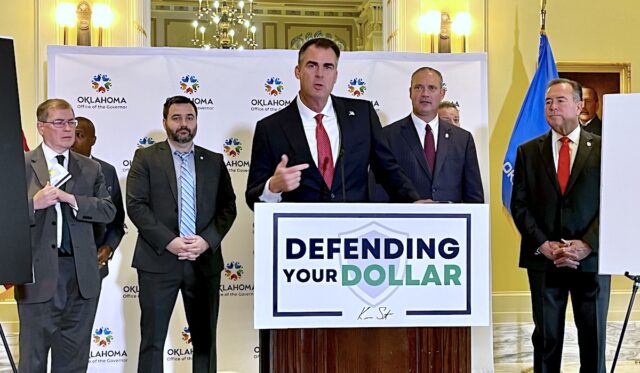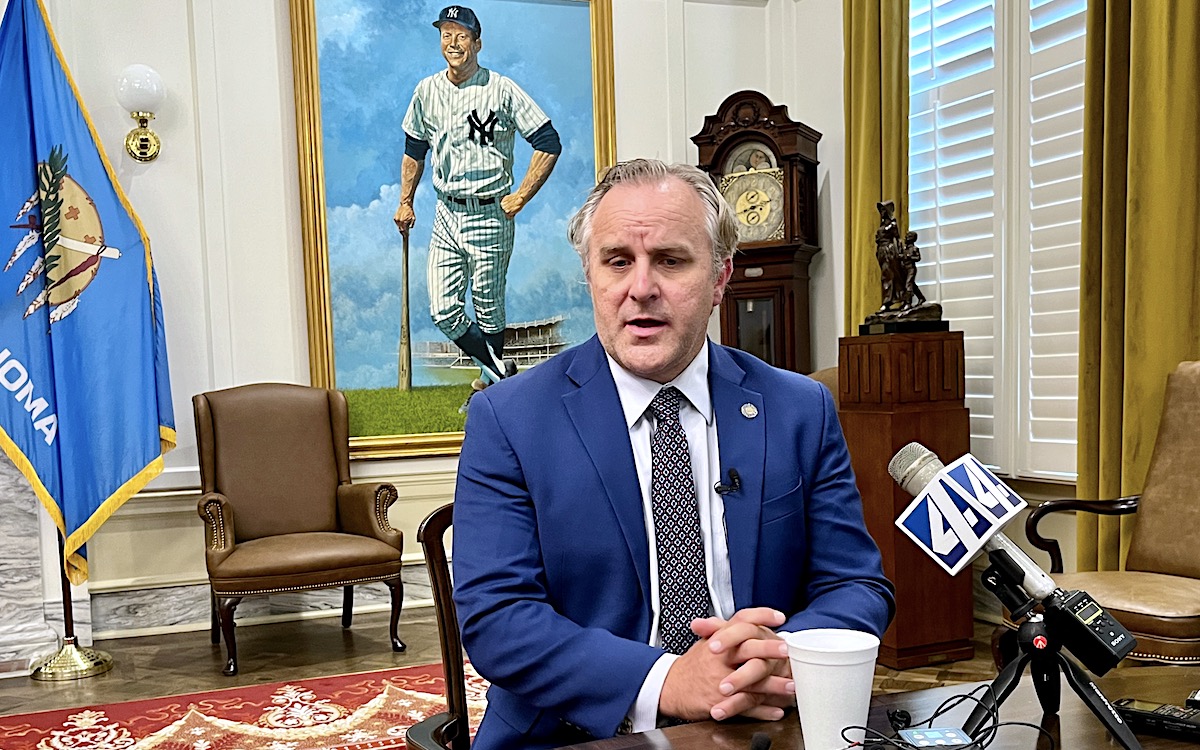

Undeterred by his most recent special session call lasting five hours and accomplishing nothing, Gov. Kevin Stitt today announced he is calling lawmakers back for another special session to seek a 0.25 percent reduction in Oklahoma’s personal income tax rate.
In his executive order, Stitt called on legislators to return Monday, Jan. 29 — one week before the start of Oklahoma’s regular four-month session. It will mark the third special session for the 59th Legislature already. In May, lawmakers called their own special session to pass several budget bills, something they did to ensure they had a chance to override any potential vetoes by Stitt, who let most of the measures become law without his signature and who filed litigation seeking to invalidate lawmakers’ actions.
“From day one, I’ve called on the Legislature to give Oklahomans a much-deserved tax cut,” Stitt said in a release. “With record-breaking savings and a strong economic outlook, there’s no time like the present to deliver a pay raise to all Oklahomans. Let’s get this across the finish line before we head into regular session.”
In October, the second special session of the 59th Legislature functionally ended on the same day it began, with the State Senate adjourning in exasperation after Stitt declined an invitation to discuss his tax-cut plans in front of the Senate Appropriations and Budget Committee. Beyond an income tax rate reduction, Stitt’s special session call in October included two other topics for consideration: transparency requirements in the state budget process; and creation of a “trigger” that would move the state toward eliminating the individual income tax entirely if a court finds that tax “inapplicable to any individual by virtue of their race, heritage, or political classification.”
On Tuesday, Stitt’s latest call specified that legislators “shall only act to put up for a vote a 0.25 percent decrease in individual income tax rates.”
For years, Stitt has said the state can afford a personal income tax rate cut, referring Tuesday to last month’s estimate of funds available for appropriation presented to the Board of Equalization, which he chairs. Stitt said the fiscal report, which he will use to draw up his executive budget proposal to lawmakers on the first day of session, Feb. 5, indicated a bright outlook. A final appropriation authority is scheduled to be approved by the board Feb. 15.
In his release, Stitt said the state has $5.4 billion in savings, a strong economy and fiscally conservative policies, making it well-positioned to trim the state’s personal income tax.
A 0.25 percent cut in the personal income tax has been estimated to drop future collections by about $240 million for the next full fiscal year. The state’s legislative-appropriated budget for the current fiscal year, which began July 1, is $12.96 billion.
Treat calls Stitt’s move a political stunt, ‘waste of taxpayer money’

Legislative leaders had a mixed reaction to Stitt’s call for a special session so close to the start of next month’s regular session.
“House Republicans will do their constitutional duty and answer the governor’s call to special session,” House Speaker Charles McCall (R-Atoka). “We will be ready to pass meaningful tax relief legislation for the hardworking people of Oklahoma as we previously have in multiple special and regular sessions.”
Senate President Pro Tem Greg Treat (R-OKC) said calling the Legislature into a special session the week before the regular session begins is a needless waste of taxpayer money.
“It is disappointing the governor would call another special session,” Treat said in a release. “I met with the governor and Speaker McCall Thursday. The governor laid out his intentions for a special session regarding tax cuts. I outlined to the governor we will not know how much money the state will have to spend on a tax cut until the Board of Equalization meets to certify budget numbers in mid-February.”
Treat, who lambasted Stitt’s negotiation tactics several times in 2023 and who has promised a heavily altered budget negotiation process for 2024, said the governor was attempting another “stunt.”
“It is unfortunate the governor has chosen this route,” Treat said. “The Senate will adhere to the call of the special session, as we have always done to respect and uphold our constitutional duty. However, I do not know what will be different between the last week in January and the last time he pulled this stunt in October.”
House Democratic Leader Cyndi Munson (D-OKC) also questioned Stitt’s fiscal responsibility by calling another special session.
“The governor’s call for a special session to cut income taxes is just his latest political stunt, and it is not a genuine attempt to lower costs for Oklahoma families,” Munson said in a statement. “We have not even completed our agency budget hearings to gain a comprehensive understanding of our state’s fiscal picture, including the potential loss of federal dollars post-COVID.
“We will have four months beginning Feb. 5 to deliberate fiscal and policy ideas. Our job as legislators is to work through these important issues, as we are called to do every year. Instead, the governor is asking us to waste time and taxpayer dollars by throwing ideas at the wall to see what sticks. It is unwise and fiscally irresponsible to ask the Legislature to haphazardly cut revenue.”
Senate Minority Leader Kay Floyd made similar remarks.
“To undertake statewide, comprehensive tax reform in five days, without committee work and public vetting and input, would serve no other purpose than to place politics over policy,” she said. “The governor’s call for a special session just one week before the regular session begins does not serve the best interest of this state or its citizens.”




















